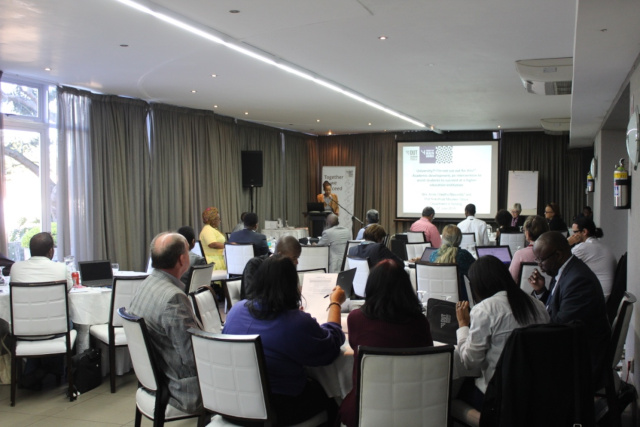The Durban University of Technology (DUT) Siyaphumelela Project hosted a two-day Student Success Task Team Workshop at the Coastlands Musgrave Hotel on 07 and 08 June 2018.
The workshop received presentations and reports back from various Siyaphumelela projects. Some of the presentations that were presented included on, Ubuntu, “I am because of others”: food security interventions at Durban University of Technology, DUT’s food security committee – what’s happening, how can Siyaphumelela help build bridges, the state of play at the margins: Current findings on co-curriculum and student success at DUT, the role of academic and social integration in student success: A case study of DUT and facilitators’ experiences regarding the extended curriculum programme: A case study of DUT.
This was also in preparation for the Siyaphumelela Conference, which commenced from yesterday (Tuesday,12 June 2018) and will end today (Thursday, 14 June 2018) at the Wanderers Club in Johannesburg, where some of these presentations are being presented.
Siyaphumelela DUT Project Driver, Nicky Muller opened the proceedings by giving a brief background on the objectives of this workshop, which was to get feedback on Siyaphumelela projects, prepare for the national conference as well as learning and sharing best practices.
The presentation on Ubuntu, “I am because of others”: food security interventions at Durban University of Technology was delivered by Dr Delysia Timm, Sboniso Ngcobo, Carol Mnguni and Celiwe Chemane, and it left a glaring picture about the dire state of food security in higher education institutions and at DUT in particular.
“We have a serious problem when it comes to food security, but we are not the only ones, this is an international issue. Research shows that there is a link between student’s achievement and access to food. Some of these students are coming from schools with feeding schemes, but we don’t have something like that at DUT, so more research is required in order to understand our students better. It is also important to build bridges and stop working in silos,” said Dr Timm.
Sboniso Ngcobo, who is a student from DUT’s Department of Food and Nutrition: Consumer Sciences, shared the student’s perspective on the issue of food security, focusing on three critical areas which are food availability, food access and food nutrition. “Based on the study we conducted, we discovered that most students were either underweight or overweight, and the problem is related to food availability and food nutrition, which is linked to issue of finances,” he said.
Another student from the Department of Food and Nutrition: Consumer Sciences, Carol Mnguni added that their study indicated that as part of the solution it is important to educate other students about the importance of proper nutrition and budgeting. “We decided to advertise the Rendezvous Restaurant more to students so that they can eat healthy and affordable food. But equally, it is also important for students to be taught how to budget and prioritize because they end up misusing their NSFAS allowances,” she said.
DUT’s Faculty of Health Sciences, Executive Dean, Prof Nokuthula Sibiya shared the facilitators perspective on the extended curriculum programme, using Nursing Sciences as a case study. “With widening access to higher education there is a need for extended curriculum for underprepared but talented students to access higher education. Our extended curriculum programme with Nursing Sciences runs over a period of five years, and our first cohort graduated this year,” she said.
“Four major themes emerged from our study including, stigmatisation and lack of confidence, lack of self-will and critical thinking skills, additional workload for facilitators due to students lack of initiative and lastly gradual improvements of students. The study concluded that the extended curriculum programme should continue to increase access and success in Higher Education Institutions, but more resources and support is required. It would also be good if we can have a forum for all DUT faculties that offer extended curriculum programme in order to share experiences,” she added.
Siyaphumelela is a project funded by Kresge Foundation which aims to improve the institutional capacity to collect and analyze student data and integrate it with institutional research, information technology systems, academic development, planning and academic divisions within the institution to increase student success.
Pictured: Some of the participants from the Siyaphumelela Student Success Task Team Workshop held at the Coastlands Musgrave Hotel.
Nduduzo Ndlovu


